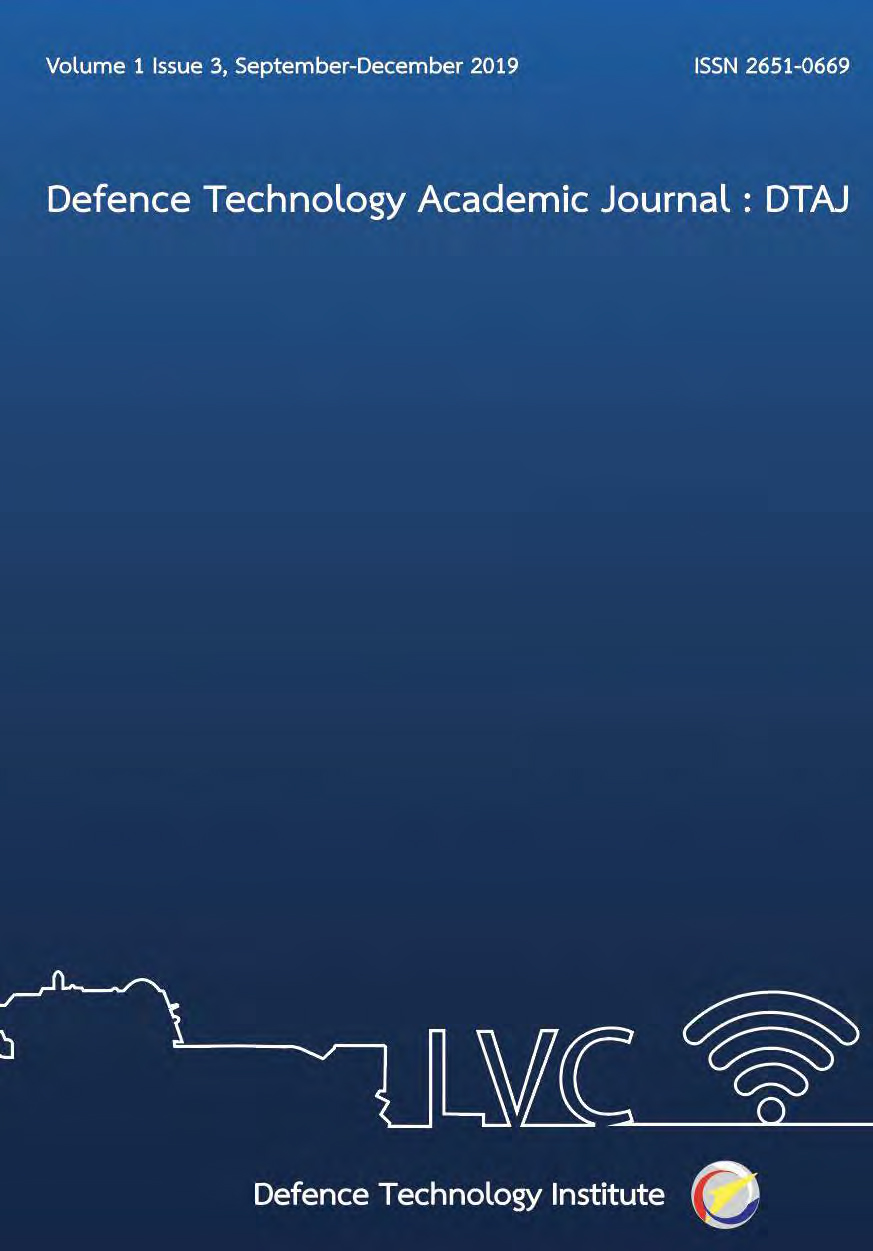Offset Policy for Thailand’s Defence Industrialization
Main Article Content
Abstract
This research article has three primary objectives. Firstly, it attepmts to describe basic definition and principles, both benefits and risks, followed by policy data and fundamental components of offsets. Secondly, it collects and analyses offset policy through cases from foreign countries, namely, Malaysia, Indonesia, and South Korea, as forerunners on such policy to see their process, failure and success. Thirdly, it analyses and compiles policy data to provide solutions to prepare for offset policy framework and parameter setting for the Thai government in the near future. In terms of research methodology, the data of this research are gathered from various sources, including academic works, news websites, online databases, laws, analysis report, interviews, especially previous major procurement program from overseas. The challenges ahead in which Thai government is likely to face are also discussed. This study also finds that offset policy is a strategic procurement method, especially the defence products whichs are not only used by armed forces but also imposed foreign suppliers with some economic and technological obligations to the importing nations as a compensating tools from the costs of the weapon systems procured. It is clear that this topic is under-studied in Thailand context but is increasingly implemented in foreign nations. The comparative research for three cases conducted here is a good begining for future researches on high-technology sourcing. This report offers four policy recommendations. First and foremost, offset policy should be a priority for government to consider. Next, in the first five years, the policy details should include offset threshold of 1,000 million baths and decrease gradually to 500 million baths. The offset value is set at 20 percent and increase to 50 percent later on. The calculation of offset value should adopt cost -approach drawn from South Korean counterpart and determine that the policy components are countertrade, offsets, and local contents in the same as Indonesian example. The third recommendation is that a consistent and sustainable policy implementation should be geared towared policy success factors from lesson learns as discussed in the paper. Lastly, an Offset Internship Program should be established to study the in-depth practical aspects of this offset policy
Downloads
Article Details

This work is licensed under a Creative Commons Attribution-NonCommercial-NoDerivatives 4.0 International License.
Journal of TCI is licensed under a Creative Commons Attribution-NonCommercial-NoDerivatives 4.0 International (CC BY-NC-ND 4.0) licence, unless otherwise stated. Please read our Policies page for more information...
References
Kogila Balakrishnan. Evaluating the Effectiveness of Offsets as a Mechanism for Promoting Malaysian Defence Industrial and Technological Development''. Ph.D.thesis. Cranfield University.
Udis, B. and K.E.Maskus (1991) “Offsets as Industrial Policy: Lessons from Aerospace.” Defence Economics. Vol. 2, No. 2.
Overview of the Agreement on Government Procurement, World Trade Organization, https://www.wto.org/english/tratop_e/gproc_e/gpa_overview_e.htm
Article XXIII: Exceptions to the Agreement, Agreement on Government Procurement, World Trade Organization, https://www.wto.org/english/docs_e/legal_e/gpr-94_02_e.htm#articleXXIII
Guidance Note Offsets, Directive 2009/81/EC on the award of contracts in the fields of defence and security, Directorate General Internal Markets and Services
Offsets in Defense Trade, Bureau of Industry and Security, US Department of Commerce https://www.bis.doc.gov/index.php/other-areas/strategic-industries-and-economic-security-sies/offsets-in-defense-trade
Korean Defence Offset Walkthrough, APEX Translation.
Kogila Balakrishnan and Ron Matthews. "The Role of Offsets in Malaysian Defence Industrialisation''. in: Defence and Peace Economics. By editor Kieth Hartley and Todd Sandler. 4th edition. volume 20. New York: Routledge.
Kogila Balakrishnan. Malaysia: Do offsets work?,” Evaluating the Effectiveness of Offsets as a Mechanism for Promoting Malaysian Defence Industrial and Technological Development''. Ph.D.thesis, Cranfield University.
Andi Widjajanto. ASEAN Security Community vs Minimum Essential Force. url: http://www.thejakartapost.com/news/2011/11/24/asean-security-community-vs-minimumessentialforce.
Offset Program Guidelines, Chapter 1. General Provisions, DAPA Standard Operating Procedure (Seoul: Defence Acquisition Program Administration, 2014).
Curie Maharani. Contribution of offset to defence industrialisation in Indonesia, Ph.D.thesis, Cranfield University.
นโยบายออฟเซตเพื่อการพัฒนาอุตสาหกรรมป้องกันประเทศของไทย, โครงการวิจัย, ฝ่ายนโยบายชาติและความสัมพันธ์ข้ามชาติ สำนักงานคณะกรรมการส่งเสริมวิทยาศาสตร์ วิจัย และนวัตกรรม (สกสว.).


